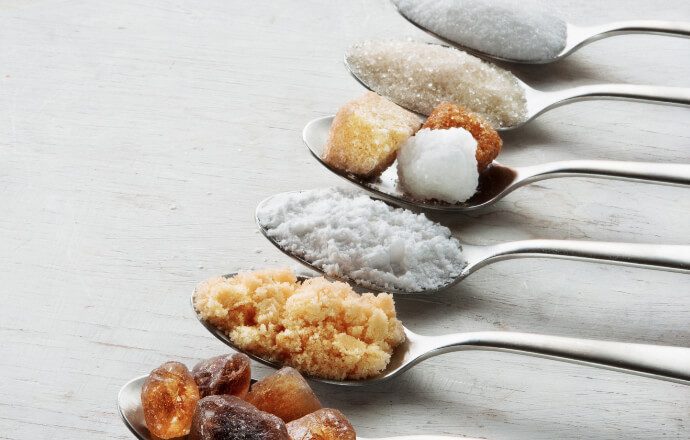Sugar has been subject of much public debate recently – and with good reason.
Last year, official guidance on sugar consumption changed, reducing the recommended daily allowance to 90g or less, of which only 30g at most should be processed sugar. So why is that?
Understanding sugars
In order to understand sugar, it is important to first understand how your body uses it. Sweet foods, natural or processed, and also starchy carbohydrates are all broken down into small molecules called monosaccharides – sugars. This means that foods such as pasta, bread, root vegetables like sweet potatoes, and rice all turn into sugar eventually.
Absorption of sugars
The speed by which your body absorbs sugar is determined in part by the amount of fibre in food – fibre controls blood sugar release by slowing down absorption.
Once sugar is broken down, it is absorbed into your blood through the intestines as glucose. Insulin, released from the pancreas, carries the glucose into cells, where it is used for energy. Conditions such as diabetes disrupt this process, as either the amount of insulin produced is insufficient, or cells cannot use the glucose properly, meaning it stays in the bloodstream and can cause damage.
High-fibre foods take the body longer to break down, which helps to manage energy levels as well as blood sugar. So, unless you need fast energy (such as a runner in a marathon), chances are that starchy complex carbohydrates will give you the intake of sugar you need.
Varieties of sugar
There are many different varieties of sugar, and you can often identify them by the fact that they end in ‘ose’: fructose, lactose, sucrose, and maltose.
Fructose is the common sugar found in fruit, and lactose is the common sugar in milk. Sucrose is the white table sugar that we all know. There are also syrups of all kinds: maple or golden, honey, brown sugar, dextrose, or molasses. While these are all still sugars, some also contain beneficial nutrients such as agave, molasses, and maple syrup.
To improve your healthy eating, it is useful to know that fructose is absorbed much slower than glucose, and is not completely converted to glucose. This means it doesn’t cause the same sugar spike as table sugar.
Substituting sugar
There are alternatives to sugar, such as stevia, which is a plant-based too but does not raise blood sugar levels. Be careful not to consume too much of it, however, as there have been some reported side effects, such as digestive complaints.
Xylitol, similarly, is a natural product which doesn’t raise blood sugar levels, but can also have side effects with overconsumption, as it ferments in the
digestive system. Fructose can be purchased in white powder form, but excess amounts have been linked to increased levels of the hunger hormone ghrelin, which may contribute to weight gain.
In short, to lead a healthy lifestyle which includes sugar, it is crucial to be aware of the importance of fibre in managing energy levels and blood sugar.
Aiming for 2-3 portions of protein a day, along with beneficial fats and vegetables, will help you achieve the balance your body needs.
Sophie Murray is Head of Nutrition and Hydration at Sunrise Senior Living UK and Gracewell Healthcare, as well as a qualified nurse and award-winning nutritionist.










